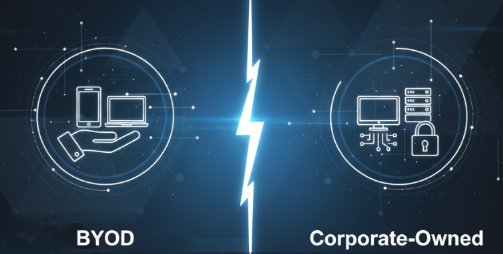BYOD vs. Corporate-Owned: Guide to Your Android MDM Strategy
As a mobile workforce becomes standard, businesses face a critical decision: should they allow employees to use their own devices (BYOD), or issue standardized corporate-owned ones? This choice extends beyond cost and efficiency—it directly impacts your company's data security and your employees' privacy.
These two models aren't mutually exclusive; they represent different management philosophies.
This guide will provide a comprehensive breakdown of the pros and cons of BYOD and corporate-owned devices. More importantly, it will show how Android MDM (Mobile Device Management) acts as the essential bridge to find the perfect balance between security and privacy.
1The Core Differences: BYOD vs. Corporate-Owned Devices
Neither model is a one-size-fits-all solution. Understanding their differences is the first step toward making an informed decision.
The BYOD (Bring Your Own Device) Model: A Symbol of Freedom and Flexibility
Definition: Employees use their personal devices—smartphones, tablets, or laptops—for work-related tasks. This model prioritizes employee convenience and satisfaction.
Advantages:
- Cost-Effectiveness: Significantly reduces corporate spending on hardware devices, maintenance, and lifecycle management.
- Employee Satisfaction: Staff can use the devices they feel comfortable with, which often leads to higher productivity and better morale.
- Increased Productivity: Eliminates the need to carry multiple devices, enabling employees to work efficiently anytime, anywhere—ideal for remote and hybrid models.
Challenges:
- Security and Privacy Risks: This is the most significant drawback. Mixing corporate and personal data on one device creates a vulnerability. If a device is lost, stolen, or infected with malware, sensitive company data is at risk.
- Legal and Compliance Issues: In legal disputes or upon employee departure, a remote wipe could accidentally delete personal data, leading to potential privacy violations and legal challenges.
- Compatibility and Fragmentation: A diverse range of device models, brands, and OS versions creates a significant management and support burden for IT departments.

The Corporate-Owned Model: A Fortress of Security and Control
Definition: The company provides employees with devices dedicated solely to work. This model prioritizes corporate data security and centralized control.
Advantages:
- Complete Control: The IT department has full administrative control over the device, allowing for the mandatory enforcement of all security policies, such as encryption, strong passwords, and application whitelisting/blacklisting.
- Simplified Management: Bulk deployment, standard configuration, and streamlined troubleshooting become incredibly simple, drastically reducing the IT workload.
- Guaranteed Data Security: Corporate data is completely isolated from an employee's personal data, preventing data leakage from personal apps or activities.
Challenges:
- High Costs: The business bears the full cost of purchasing, rolling out, and maintaining every device—a substantial investment for large workforces.
- Lower Employee Acceptance: Some employees dislike carrying multiple phones or may feel they are being overly monitored, which can lead to resistance and impact motivation.
Quick Decision Comparison Table: BYOD vs. Corporate-Owned
| Feature | BYOD Model | Corporate-Owned Model |
|---|---|---|
| Cost | Low (Employee-funded) | High (Company-funded) |
| Data Security | Higher Risk | Very Low Risk |
| Employee Acceptance | High | Lower |
| IT Management Complexity | High | Very Low |
| Compliance Risk | Higher | Lower |

2How MDM Solves the Dilemma for Both Models
Mobile Device Management (MDM) is more than just software; it's a comprehensive solution that provides the tools to secure corporate data while improving the employee experience, effectively addressing common enterprise pain points.
Solution for BYOD: Balancing Privacy and Security with Android Enterprise Work Profile
Employees, are you worried that enrolling a personal device in MDM means IT can see your private photos, messages, and browsing history?
This is precisely why you need to understand the Android Enterprise Work Profile. This Google-designed feature creates an independent, encrypted profile on a single device.
- Perfect Work-Life Separation: Your IT department can only manage and view the apps and data inside the Work Profile. Work apps are marked with a distinct briefcase badge, making them easy to distinguish from personal apps.
- Guaranteed Employee Privacy: Administrators have zero access to personal text messages, photos, browsing history, or any personal applications. The only action they can perform is to wipe the work data within the profile. This means that if an employee leaves the company, only corporate data is removed, leaving all personal files untouched and eliminating privacy risks.
- Encrypted and Secure: All data within the Work Profile is independently encrypted. Even if the personal side of the device is compromised, your corporate data remains secure.
Solution for Corporate-Owned: Improving Acceptance with Kiosk Mode & Granular Control
Employee resistance to company-issued devices often stems from a feeling of being monitored or from the device's inflexibility. MDM addresses this with features that make the device a purpose-built tool.
- Kiosk Mode: This feature locks a device down to a single application or a pre-approved set of apps. For example, a logistics company can lock devices to run only order management, navigation, and scanning apps. This simplifies the user experience and transforms the device into a purely functional work tool, not a "personal phone" that feels monitored.
- Transparent and Functional Restrictions: IT can disable features like the camera, Bluetooth, or the app store based on business needs. By setting clear and reasonable boundaries, employees understand that the controls are for operational purposes, not for surveillance, which helps build trust.
3Best Practices: Turning Your MDM Strategy into Business Value
Deploying MDM is a strategic project, not just a software purchase. Follow these three principles to ensure your MDM solution delivers real value.
1. Start with Business Value, Not Cost
Don't view MDM as a mandatory expense for compliance. Instead, see it as a tool to drive efficiency and gain a competitive edge. For instance, in the logistics industry, MDM's remote control and location tracking can help dispatchers optimize routes in real-time, improving delivery efficiency and boosting customer satisfaction with accurate arrival predictions.
2. Adopt a Phased Rollout Strategy
Implementing all MDM features at once can overwhelm employees and create resistance. A phased approach ensures a smoother transition:
Phase 1 (Foundation): Deploy MDM and activate the Work Profile to ensure basic data segregation. This solves the core security risk of BYOD.
Phase 2 (Enhancement): Implement application management and security policies to standardize software and distribute role-specific apps.
Phase 3 (Optimization): Integrate automated workflows and reporting for data-driven management, such as zero-touch enrollment and automated compliance audits.
3. Integrate Technology with Policy
Technology is most effective when supported by clear guidelines. While deploying MDM, simultaneously develop an Acceptable Use Policy (AUP) that clearly defines employee rights and responsibilities. This ensures the technical solution is aligned with the company culture and its operational procedures, addressing risk at its root.
4Conclusion: MDM, the Bridge to Trust and Efficiency
There is no straightforward answer in the debate between BYOD and corporate-owned devices. The best strategy depends on your industry, security requirements, and company culture.
MDM provides the flexibility to make either model work—or even support a hybrid approach. By providing powerful features like the Work Profile to protect privacy and Kiosk Mode to create dedicated work tools, businesses can secure sensitive data while empowering employees. Ultimately, MDM builds a mobile work environment founded on trust and efficiency.
Ready to choose the right MDM strategy for your business?
AirDroid Business provide expert consulting and powerful MDM solutions for your Android fleet. Start your free trial and get a personalized consultation and start your journey toward secure corporate mobility.







Leave a Reply.